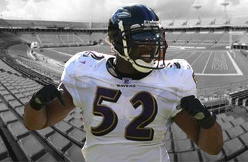Eight years later, Ray Lewis has a chance to return to the Super Bowl. And that chance begets yet another: an opportunity to be recognized as the best defensive player in the NFL. Not this year. Not this decade. Ever.
It's a difficult, if not impossible proposition, comparing defensive players. Reliable statistics for tackles didn't exist before 1994, according to STATS INC. And what of the tackles a player didn't make because offenses ran or threw the other way? How to measure that?
In Lewis' case, a qualitative standard is in order. His supporting cast may change. Ed Reed and Terrell Suggs were still in college when Lewis earned MVP honors in Super Bowl XXXV. This year's team features rookies at head coach and quarterback. Still, now as ever, the Ravens get by with just enough offense. Ray Lewis makes that possible. For more than a decade, he has been at the very center — literally, metaphorically, emotionally — of a great defense.
I'm not telling you to like the guy. For many, the perception of Ray Lewis was indelibly framed early in 2000, when he was indicted for the stabbing death of two men following a Super Bowl party in Atlanta. Lewis pleaded guilty to misdemeanor obstruction charges, and testified against his former friends, both of whom were acquitted. In short order, Lewis was comparing himself to another unjustly persecuted man, Jesus Christ.
In the years since, Lewis has tried to refurbish his image through charitable works. Does that make him an undercover thug or a man of God? I don't know. I'm not telling you not to hate him, either. Just understand that his teammates love him. Always have. You've never heard a guy who played with Ray Lewis come back to knock him. He has a quality most often attributed to great point guard and quarterbacks, an ability to raise the game of those around him. As it pertains to both defense and leadership, he sets the standard.
There are others who warrant mention in this 'best-ever' debate. But hitters tend to fade fast. Jack Lambert played his last full season at 31. Dick Butkus, long considered the standard for middle linebackers, was finished by 31 as well. Butkus never even made the playoffs. What's more, as Sean Lahman points out in The Pro Football Historical Abstract, the Butkus Bears "finished in the bottom half of the NFL's defenses five out of nine seasons."
Junior Seau, who came up in 1990, has more tackles than Lewis. But he never won a Super Bowl, much less the game's coveted MVP award. Mike Singletary is an interesting choice, but the success of his teams had as much to do with Walter Payton as anyone. Lawrence Taylor, of course, forever changed the game, making outside linebacker a glamour position. But for all of Taylor's dramatic talent, he was also a scab and a coke-head, not exactly what one looks for in a teammate.
As Lewis goes, so go the Ravens. According to STATS INC., in '96, when he was drafted, Baltimore was ranked 30th, dead last, in yards allowed. By '99, they were second. The intervening years — except for 2002, when an injured shoulder limited Lewis to only five games — have seen the Ravens finish no worse than sixth.
Despite a rookie coach and a rookie quarterback, this was in many ways a typical year for Baltimore. Lewis is in his 13th season (LT, it's worth mentioning, retired after 13), his tenth as a Pro Bowler, his sixth as a first-team All-Pro. The Ravens, second in yards allowed, have another chance at the Super Bowl. At 33, Lewis is also tied for the lead in tackles in these playoffs.
But again, I'm trying to measure what can't be quantified. You can't figure Ray Lewis by the numbers. You can only acknowledge that which he instills in friend and foe, a legacy of equal parts, fear and respect.
(foxsports.com)


